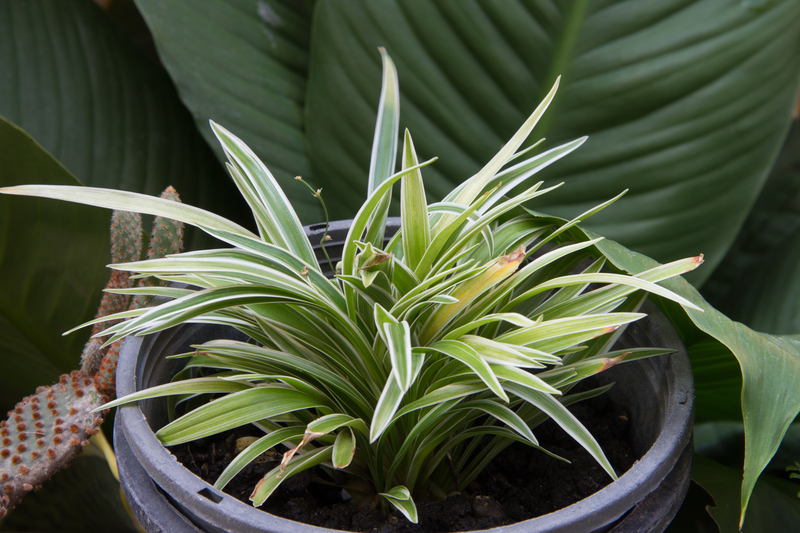Harness Gardening Innovations to Fight Climate Change
Posted on 10/06/2025
Harness Gardening Innovations to Fight Climate Change
Climate change is one of the most significant challenges facing humanity today. From unpredictable weather patterns to extreme events and biodiversity loss, the effects of a warming planet are felt worldwide. But amidst these challenges, hope blossoms in our own backyards. Innovative gardening practices can play a powerful role in mitigating climate change, promoting sustainability, and enhancing environmental resilience. This comprehensive guide will explore how you can harness gardening innovations to combat climate change, promoting a healthier planet for generations to come.
Understanding the Connection: Gardening and Climate Change
Gardeners, whether urban dwellers or rural landowners, have a unique opportunity to make a difference. Gardens can capture carbon, foster biodiversity, and improve local climates. By embracing climate-conscious gardening techniques, individuals and communities can significantly reduce their environmental footprint and even help reverse damage.
- Soil Health: Healthy soils act as carbon sinks, absorbing and storing atmospheric carbon dioxide.
- Plant Diversity: Diverse gardens support beneficial insects, birds, and other wildlife, strengthening local ecosystems.
- Resource Efficiency: Smart gardening reduces water, energy, and chemical use, lowering greenhouse gas emissions.
- Food Production: Growing food at home cuts down on supermarket supply chains, transportation, and packaging-intensive processes.

Innovative Gardening Techniques That Fight Climate Change
As the world seeks new solutions to a global crisis, the garden becomes a laboratory for climate action. Below, you'll discover the most impactful innovations in climate-friendly gardening, how they work, and steps to integrate them into your personal or community garden.
Regenerative Gardening: Building Soil Health
At the heart of garden innovations that tackle climate change is regenerative gardening. This method centers around improving and revitalizing the soil, making it more productive while storing carbon from the atmosphere. Adopting these regenerative gardening techniques supports long-term environmental health:
- No-Till or Low-Till Gardening: Reduces soil disturbance, preserves soil structure, and limits carbon release.
- Using Compost: Turns organic waste into nutrient-rich soil, cuts methane emissions from landfills, and boosts carbon sequestration.
- Cover Cropping: Planting legumes or grasses during off-seasons adds biomass, improves soil fertility, and prevents erosion.
- Mulching: Protects soil, retains moisture, moderates temperature, and encourages beneficial microorganisms.
- Biochar Application: Adding biochar--a stable, carbon-rich form of charcoal--can lock carbon in the ground for centuries while enhancing soil health.
How to start? Begin by assessing your soil's current state, introducing compost and mulch, and minimizing digging. Cover any bare soil with living plants--even in the off-season--and explore the use of biochar for long-term carbon storage.
Rainwater Harvesting and Smart Irrigation
Water management is crucial as climate change brings erratic rainfall and periodic droughts. Innovative rainwater harvesting and irrigation solutions make gardens resilient in the face of water scarcity while reducing the environmental impact of municipal water use:
- Rain Barrels & Underground Cisterns: Capture and store rainwater from rooftops for later use in the garden.
- Drip Irrigation Systems: Deliver water directly to plant roots, reducing waste and evaporation.
- Soil Moisture Sensors: Automate watering so plants receive precisely what they need--no more, no less.
- Drought-Tolerant Plant Selection: Choose native and adapted species that thrive with minimal water.
Implementing these solutions can dramatically reduce water consumption, save on utilities, and help gardens endure even the harshest weather conditions accumulating from climate change.
Permaculture and Polyculture: Imitating Nature's Genius
Modern gardening often relies on monocultures--planting large areas with a single crop--which can exhaust soil nutrients and require high chemical usage. Permaculture and polyculture gardening methods combat these downsides by mimicking natural ecosystems:
- Guild Planting: Combine plants with complementary roles (e.g., nitrogen fixers, pest deterrents, pollinator attractors) to create self-sustaining plant communities.
- Forest Gardening: Structure gardens in layers--from tall trees to low groundcovers--to maximize carbon sequestration and biodiversity.
- Intercropping: Plant a mix of crops together to increase yields, reduce pests, and make more efficient use of soil nutrients.
These biodiverse gardening techniques not only store more carbon and nurture a range of life, but they also build resilience into your garden, allowing it to better adapt to changing climates.
Vertical Gardening and Urban Greening
As more people move to cities, urban gardening innovations become crucial. Gardens on rooftops, balconies, and even walls help offset climate change by cooling cities, filtering pollutants, and expanding green spaces:
- Vertical Gardening Systems: Grow plants in stacked layers or on wall-mounted structures, maximizing small spaces and increasing carbon capture.
- Green Roofs: Cover building tops with soil and vegetation to insulate, absorb rainwater, and cool urban heat islands.
- Living Walls: Install panels of living plants that purify the air and beautify concrete jungles.
- Community Garden Plots: Turn vacant lots and rooftops into productive oases, feeding neighborhoods and developing climate-smart skills.
Tip: Start with a small vertical garden or a few planters, and scale up once you see the benefits in your own urban environment.
Technology's Role: Smart Tools to Enhance Climate-Conscious Gardening
Technological advancements are transforming the age-old art of gardening into a precise, efficient, and data-driven endeavor. Here are some cutting-edge gardening technologies that help fight climate change:
- Solar-Powered Garden Devices: Reduce reliance on fossil fuels to power irrigation, lighting, and monitoring systems.
- Garden Sensors and IoT Devices: Track soil health, moisture, nutrient levels, and climate data for informed interventions.
- Automated Composters: Convert food and garden waste into rich compost quickly and conveniently, shrinking your carbon footprint.
- Plant ID and Pest Detection Apps: Use smartphones to identify invasive species and respond to pests without excessive pesticide use.
Embrace the smart garden revolution by integrating one or more devices into your gardening routine. Save time, reduce errors, conserve resources, and multiply your environmental impact.
Reducing Waste: Composting and Circular Gardening
Waste in the garden contributes to climate change when organic material ends up in landfills, generating greenhouse gases. Composting is one of the most accessible ways any gardener or household can participate in the fight against global warming:
- Backyard Composting: Combine kitchen scraps, grass clippings, and leaves into a single pile or bin. Nature does the rest--producing rich, carbon-storing soil amendment.
- Vermicomposting: Use worms to break down waste rapidly and efficiently, even in small urban spaces.
- Bokashi Fermentation: Employ innovative fermentation methods to compost a wider array of food waste, including dairy and meats.
By creating a closed-loop system that cycles nutrients within the garden, you reduce methane emissions, enrich your soil, and close the gap toward a sustainable, zero-waste lifestyle.
Embracing Native and Climate-Resilient Plants
Choosing appropriate plants is a cornerstone of climate-adaptive gardening. Native plants and climate-resilient varieties require less water, fewer fertilizers, and adapt better to local weather extremes. Here's how to harness their power for climate mitigation:
- Match Plants to Your Ecozone: Research what grows naturally in your region for maximum resilience and minimal intervention.
- Drought-Resistant Species: Select varieties that thrive under projected climate scenarios, ensuring survival through heatwaves and dry spells.
- Pest and Disease-Resistant Hybrids: Choose cultivars bred for resistance, eliminating the need for chemical controls.
- Pollinator Gardens: Support bees, butterflies, and beneficial insects by prioritizing pollen- and nectar-rich flowers.
Native and climate-tough gardens become self-sustaining havens, require less maintenance, and draw down more atmospheric carbon over their lifespan.
Community Gardening and Social Innovations
The fight against climate change is stronger together. Community and social gardening projects facilitate knowledge sharing, foster biodiversity, and multiply the scale of environmental stewardship:
- Shared Garden Spaces: Co-manage gardens with neighbors, schools, or faith organizations to expand green zones in urban and suburban areas.
- Seed Libraries and Swaps: Share seeds adapted to local conditions, increasing genetic diversity and spreading climate-smart varieties.
- Educational Workshops: Teach and learn best practices for innovative, climate-wise gardening from peers and experts alike.
- Advocacy Initiatives: Collaborate on policies that incentivize sustainable gardening at municipal and national levels.
Supporting community-driven efforts amplifies the impact of individual actions and accelerates the adoption of climate-friendly techniques.
Measuring the Impact: Carbon Counting and Garden Metrics
How do you know your gardening innovations are making a difference against climate change? Modern tracking methods help gardeners understand and share their progress:
- Carbon Footprint Calculators: Estimate your garden's ability to sequester carbon and its climate impact.
- Citizen Science Networks: Contribute data to organizations tracking pollinator populations, plant health, and changing weather patterns.
- Seasonal Reviews: Regularly record yields, soil health, water efficiency, and biodiversity, adapting plans for even greater gains over time.
Documenting your efforts not only quantifies your garden's ecological benefits but also inspires neighbors and wider communities to follow suit.

Future Prospects: Research, Policy, and Global Cooperation
While individual innovation is critical, large-scale action amplifies impact. Scientists, governments, and NGOs are driving research and pilot projects on climate-smart agriculture, urban green infrastructure, and ecosystem restoration. Supporting these initiatives through advocacy and involvement helps create the systemic change needed for a sustainable future.
Get Involved:
- Support and participate in local and global green initiatives.
- Lobby for policies that incentivize urban and rural regenerative gardening.
- Stay informed about the latest research and apply findings in your gardens.
Conclusion: Every Garden Counts in the Fight Against Climate Change
Climate change may seem overwhelming, but its reversal begins at home. Adopting innovative gardening techniques like regenerative practices, smart water use, polyculture design, and advanced technologies transforms gardens into potent tools for climate action. Community efforts and policy changes further multiply their effect.
Remember: Every seed sown, every drop of rain saved, and every clump of composted soil is a step toward a healthier, more resilient world. Start small, dream big, and inspire others to join you. Together, we can transform the global landscape, one innovative garden at a time.
```Latest Posts
Innovative Ideas to Shield Your Garden from Weather Threats
Foster nature's beauty with orchid knowledge
Hedge Artistry: Perfect Shapes and Techniques for Every Gardener

